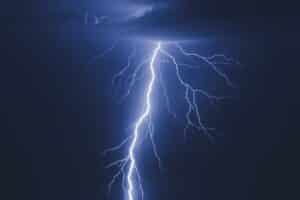
A lightning strike can cause brain damage by affecting the function of the central nervous system, motor neurons, and peripheral nerves. Lightning can also cause the heart to stop, cutting off the oxygen supply to the brain. In either case, the result may be a lightning strike acquired brain injury.
While a lightning strike acquired brain injury is similar to those from other electrical shocks, they are usually much more severe in nature.
Types of Lightning Strikes
Lightning strikes occur in different ways, and any of them can lead to an acquired brain injury. Lightning strikes are most common during storms but can even occur when the sky appears clear. Common types of lightning strikes include:
- Direct strike: Direct strikes often occur when swimming, hiking, golfing, or playing sports in an open area. They are the most severe type of strike, often causing burns, cardiac arrest, and acquired brain injury.
- Side flash: A side flash occurs most commonly when the person is hiding under a tree, metal awning, or other cover that is hit by lightning.
- Ground current: Ground currents can cause injuries when lightning strikes a nearby target and travels through the ground. Ground current strikes cause more lightning deaths and injuries than any other type, according to the National Weather Service.
- Conduction: Conduction strikes occur when the victim is in contact with conductive materials at the time of their injury. These include appliances plugged into a wall outlet, corded telephones, water faucets, windows, doors, and showers.
Each of these lightning strikes differs in how it affects the body, although any of them can cause serious brain injuries and lasting impairments.
Understanding the Effects of a Lightning Strike on the Brain
Most people who suffer from lightning strikes survive their injuries. According to National Geographic, nine out of every ten victims survive but many suffer permanent injuries.
Many lightning strikes require immediate medical care, sometimes including CPR and AED administration. The shock will often stop the heart, and this proves to be the most immediate concern after many incidents.
Lightning strike acquired brain injuries are often diffuse, affecting large areas of the brain. Some of the temporary and lasting effects of a lightning strike brain injury include:
- Loss of consciousness
- Muscular pain, weakness, and discomfort
- Severe general fatigue
- Headaches
- Loss of sensation, numbness, and other peripheral nerve conduction concerns
- Poor balance and coordination
- Slowed mental processing
- Lack of attention, concentration, and focus
- Concerns with short-term memory and other memory loss
- Psychological symptoms, including personality changes
- Dizziness and disorientation
- Depression
The long-term effects of a lightning strike are difficult to predict. Surviving the initial jolt and getting immediate care for cardiac injuries is paramount. Rehabilitation and therapy also play a key role in how completely someone recovers. Other important factors include:
- Age and health
- How long the victim was without oxygen
- The areas of the brain that suffered damage
- Other co-occurring or pre-existing conditions
Because each lightning strike affects the victim differently, it is impossible to predict the prognosis without knowing the specific details. It’s important to discuss your loved one’s prognosis, rehabilitation, and recovery with their doctor. This will help you understand the level of ongoing and supportive care that may be necessary.
Rehabilitation After a Lightning Strike and ABI
Rehabilitation and therapy are key in helping survivors of lightning strikes recover as fully as possible. Doctors classify brain injuries as mild, moderate, or severe, based on the severity of the injury and the loss of consciousness.
Most lightning strikes cause moderate or severe injuries, and many people spend several weeks in the hospital for treatment of burns, cardiac injuries, and brain injuries. Once they transfer to an inpatient rehabilitation facility, they can begin intensive treatment to regain strength and relearn to walk, talk, and complete self-care tasks. Many also attend outpatient physical, cognitive, speech, and occupational therapies.
Even mild ABIs can lead to lasting impairments, but the risk increases with more serious injuries. Many victims eventually learn to adapt to their limitations, and some recover fully thanks to rehabilitation and therapy. Others require ongoing care for the remainder of their lives.
Pursuing Compensation After a Lightning Strike ABI
Many lightning strike incidents support a personal injury claim, especially if negligence played a role in causing or contributing to injuries. For example, imagine:
- You have to work in unsafe weather conditions, such as during a storm.
- A property owner exposes you to risk by failing to take precautions with pools, ponds, and metal conductors.
- Your child’s school allowed the students to continue to play outside in threatening weather.
- A sports organization continued to play during dangerous weather conditions.
- A stadium, park, or other institution failed to take precautions to protect visitors from lightning.
Personal injury law firm Newsome | Melton will review your case and determine if you have the legal right to take action against the liable party. If you or a member of your family suffered brain injuries during a lightning strike incident, you may be eligible to pursue compensation. Let us protect your rights and take legal action in your case. Call Newsome | Melton today to get started: (800) 917-5888.
